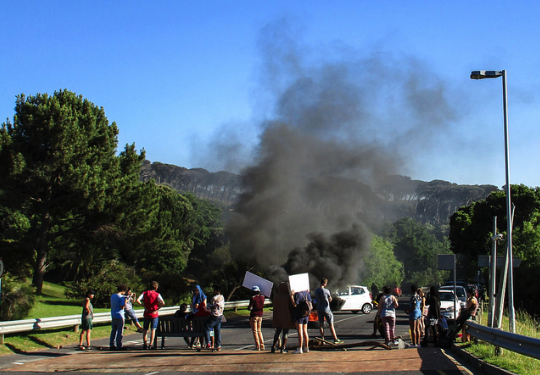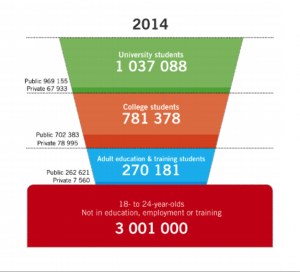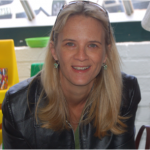Open Education in South African Higher Education
This post, written by Glenda Cox showcases an insightful perspective of the Open Education situation in the South African Higher Education System
As I write this piece in late 2016 Higher Education in South Africa is in crisis with the sector facing a wave of student protests calling for free higher education under the call #feesmustfall and for the ‘decolonisation of the curriculum’. The ideals of transformation following the end of Apartheid in 1994 appear not to have been satisfied and although Higher Education Institutions (HEIs) are attempting to rectify what they can, protest action has forced many institutions to suspend their teaching programmes.

Fees must fall, Picture by By Ian Barbour; Wikimedia, CC BY-NC-SA https://www.flickr.com/photos/barbourians/22697273532/in/photostream/
Public Higher Education Institutions in SA
South Africa has 26 public institutions of Higher Education. South Africa’s universities accommodate in excess of 1 million students. While SA has the best HE system in Africa, it has flaws and these are becoming very apparent during the #feesmustfall crisis. A major problem for SA, is that while SA has 2 million students in tertiary education, there are 3 million 18-24 year-olds not in education, employment or training (NEETs). For a detailed and expert review of the post-school situation in SA the CHET website has many reports and includes Open Data on http://www.chet.org.za/news/sustainable-higher-education-funding

Shape of Post-school system (http://www.chet.org.za/data/sahe-open-data)
Open Education at the University of Cape Town (UCT)
I work at the University of Cape Town (UCT) in the Centre for Innovation in Learning and Teaching (CILT) and we developed UCT’s first open content directory. The purpose of the initial directory was to provide a place for UCT academics to share OER. That same OER is now shared in the new OpenUCT repository, launched in June 2014 and managed by the UCT Library. Contribution to the UCT OC directory is voluntary.
In 2014, an Open Access (OA) policy was introduced that encourages the sharing of teaching materials. However, there is no specific mandate. There is no financial or status reward or recognition in annual performance reviews for contributing teaching materials to OpenUCT or any other Open platform.
Before the OA policy came into being in 2014, 332 resources had been added to UCT OC on voluntary basis (some with the assistance of small grants). Over 200 lecturers, ranging from young lecturers to A-rated research professors across all faculties at the institution, contributed content to the directory (Cox, 2013). Nevertheless, those who added materials formed a small percentage of UCT staff (10% of approximately 2500 part time and full time academic staff).
UCT also has a Massive Open Online Project (MOOC) project (2014-2017) managed in CILT. Guidelines for what is expected, how materials will be designed and how they will be openly licensed are set out on the CILT website.
Overview of Open Education in South Africa
In May, 2012, the South African Department of Higher Education and Training included a section on the value of OER in their Draft Policy Framework for the Provision of Distance Education in South African Universities (Department of Higher Education and Training, 2014). However, there is no South African national policy on OER as of yet.
Only five of the public HEIs (UCT, Nelson Mandela Metropolitan University, University of Limpopo, University of Venda and Rhodes) have policy that gives the lecturer copyright to release their materials as OER. The presence of policy does not automatically result in sharing of OER. There are number of other variables which also need to be in place before OER is adopted.
The University of the Western Cape (UWC) was the first South African university to create an OER directory. Although the initiative was strongly supported by university policy, the path to sustainability has been a slow one with only a few lecturers participating. “Getting actual buy-in from participants” was acknowledged as important for the future of the UWC involvement in OER (Keats, 2009:54).
The University of South Africa (UNISA) launched an OER initiative in 2012 which included developing a UNISA OER Strategy. This must still be operationalised and encoded in formal policy, but the Strategy suggests that this ideological commitment to openness may eventually pay off in concrete policies, mechanisms and actions.
There is some recent interest from Stellenbosch University, although the institution’s focus is still on Open Access (Van Der Merwe, pers. comm.). Additionally, the University of Pretoria, Faculty of Veterinary Science launched AfriVip in 2014. The national landscape of Openness over the past 4 years is slowly shifting.
Barriers to Open Education and lessons from research
The current IDRC-funded “Researching OER for Development in the Global South” project (ROER4D) seeks to build an empirical knowledge base from across South America, Africa and South and Southeast Asia (Hodgkinson-Williams, 2013). Sub Project 4, for which I was the lead researcher, focused on three South African universities – UCT, the University of Fort Hare (UFH) and UNISA and aimed to understand the factors shaping lecturers’ motivations and concerns regarding OER use and creation. There are a number of fundamental structural issues that needed to be considered and in place before an institution can be considered “OER ready”. If any of these factors – access, permission, awareness, capacity, availability or volition – fall below a critical minimum of operational acceptability, it will comprehensively impact OER decision-making and activity at the institution. We also found that the type of institutional culture that exists at a university will have a powerful impact on the types of options institutions have for engaging with OER.
Open Education in SA: The future
Currently, it is difficult to gauge the impact of existing OER in HE in SA. Crucially, UCT will be hosting the Open Education Global conference in Cape Town in March 2017 in association with the Open Education Consortium for the first time in Africa, and it is hoped that this event can increase awareness and give African-based colleagues an opportunity to attend a conference locally that in this resource constrained environment would be difficult otherwise. The conference with its theme “Open for Participation’ welcomes delegates from all education sectors, the community and government.
In South Africa we wait to hear how events will unfold over the next few weeks but the effects are already being felt as 2016 draws to a close. In this time of crisis the sharing of teaching materials and the development of open educational practices across HE must be seen as a priority- we cannot afford to reinvent the wheel. It is up to Open Education advocates to show institutions and lecturers the value in sharing.
—
About the author
 Dr Glenda Cox is a senior lecturer in the Centre for Innovation in Learning and Teaching (CILT) the University of Cape Town and her portfolio includes Curriculum projects, Teaching with Technology innovation grants, Open Education Resources and Staff development. She has recently completed her PhD in Education and her research focused on using the theoretical approach of Social Realism to explain why academic staff choose to contribute or not to contribute their teaching resources as open educational resources. She believes supporting and showcasing UCT staff who are excellent teachers, both in traditional face-to-face classrooms and the online world, is of great importance. She is passionate about the role of Open Education in the changing world of Higher Education.
Dr Glenda Cox is a senior lecturer in the Centre for Innovation in Learning and Teaching (CILT) the University of Cape Town and her portfolio includes Curriculum projects, Teaching with Technology innovation grants, Open Education Resources and Staff development. She has recently completed her PhD in Education and her research focused on using the theoretical approach of Social Realism to explain why academic staff choose to contribute or not to contribute their teaching resources as open educational resources. She believes supporting and showcasing UCT staff who are excellent teachers, both in traditional face-to-face classrooms and the online world, is of great importance. She is passionate about the role of Open Education in the changing world of Higher Education.
 Open Education Working Group
Open Education Working Group 



Open Education in the South African Higher Education System.
Other than the few higher education institutions mentioned in Glenda Cox’s blog, the voice of the South African Institute for Distance Education (Saide) in debates and innovations on Open Educational Resources (OER) in higher education in South Africa and in Sub-Saharan Africa cannot be ignored. Besides contributing to the policy on the Provision of Distance Education in South African Universities (http://www.saide.org.za/sites/default/files/37811_gon535.pdf ) in general, and the specific section on OER, Saide was also instrumental in ensuring that the use of open educational resources was incorporated in the White Paper for Post-School Education and Training (http://www.dhet.gov.za/SiteAssets/Latest%20News/White%20paper%20for%20post-school%20education%20and%20training.pdf#search=white%20paper )
Saide has been working with various higher education institutions on OER. Most of the initiatives were implemented under the umbrella of OER Africa, a ground-breaking initiative established by Saide to enhance its leading role in supporting higher education institutions across Africa in the development and use of OER to enhance teaching and learning: http://www.oerafrica.org/ . Initiatives implemented so far have mainly been on advocacy for OER, creating an enabling environment through policy, and building an African OER network. Saide’s OER strategy is aimed at improving access and quality of higher education in African higher education institutions.
Examples of Saide’s OER initiatives include the following:
African Health OER Network whose mission is to advance health education in Africa by using open educational resources (OER) to share knowledge, address curriculum gaps, and support communities around health education. Detailed information about this network and its work are available on: http://www.oerafrica.org/african-health-oer-network/about-us
African Teacher Education OER Network (ATEN) whose goal is to assist African teacher educators inform and influence policy in their own institutions in respect of OER, and share expertise, experience and resources to improve teacher education in local contexts. ATEN’s work is aimed at encouraging understanding, use, and sharing of Open Educational Resources (OER) to support teacher education and development in Africa. Details of the Network’s work are available on: http://www.oerafrica.org/teachered
AgShare, an alignment initiative aimed at leveraging the attention of existing organizations to create and openly share different types of OER that strengthen agriculture faculty and curriculum and create downstream uses of the OER for other stakeholders in the agriculture sector. This initiative was implemented in two phases. The first phase was a pilot phase where partner institutions were supported to understand OER and their value in teaching and learning, and producing OER products to support their academic programmes. The second phase involved using a research-based approach (the Agshare method) for the co-creation and release/sharing of purposeful agricultural knowledge within and across stakeholder groups. The following site provides details about this initiative: http://www.oerafrica.org/agshare
OER Africa Participatory Action Research project is a three-year project that is being implemented in four universities, two in South Africa, one in Tanzania and one in Kenya. The project involves supporting the four institutions in the development and use of OER to enhance teaching and learning. The specific goals of this project are to institutionalize OER practices in project universities, develop capacity of university staff in the institutions to make use of OER in ways that support pedagogical transformation, foster critical reflection of OER practices through the implementation of Participatory Action Research (PAR) activities, and support pedagogical transformation through effective communication and advocacy that shares institutional lessons learned through the PAR processes at the four institutions. More information about this project is available on: http://www.oerafrica.org/keywords/participatory-action-research
The African Storybook Initiative is another ground breaking Saide initiative which is making a contribution to the improvement of early literacy among African children by facilitating availability, access to and use of sufficient good stories that are contextually relevant and are in familiar language for early reading practice for African children. The initiative is unique in that it uses a digital publishing model to publish openly licensed reading resources for various reading levels. Through the use of specially designed tools that are available on the website, the initiative encourages translation and/or adaptation of stories into a familiar language and context, or creation of own stories and uploading them on the website. To date, the project has generated 741 unique titles and 2899 translations/adaptations in 98 different languages all of which are openly licensed and are available on the website. Several higher education institutions responsible for teacher training have registered interest in integrating African Storybook stories in their teacher training programmes for early literacy development. The African Storybook resources can be accessed on: http://www.africanstorybook.org/
The initiatives described above are a few examples of the work Saide is doing to enhance the quality of higher education provision in through OER.